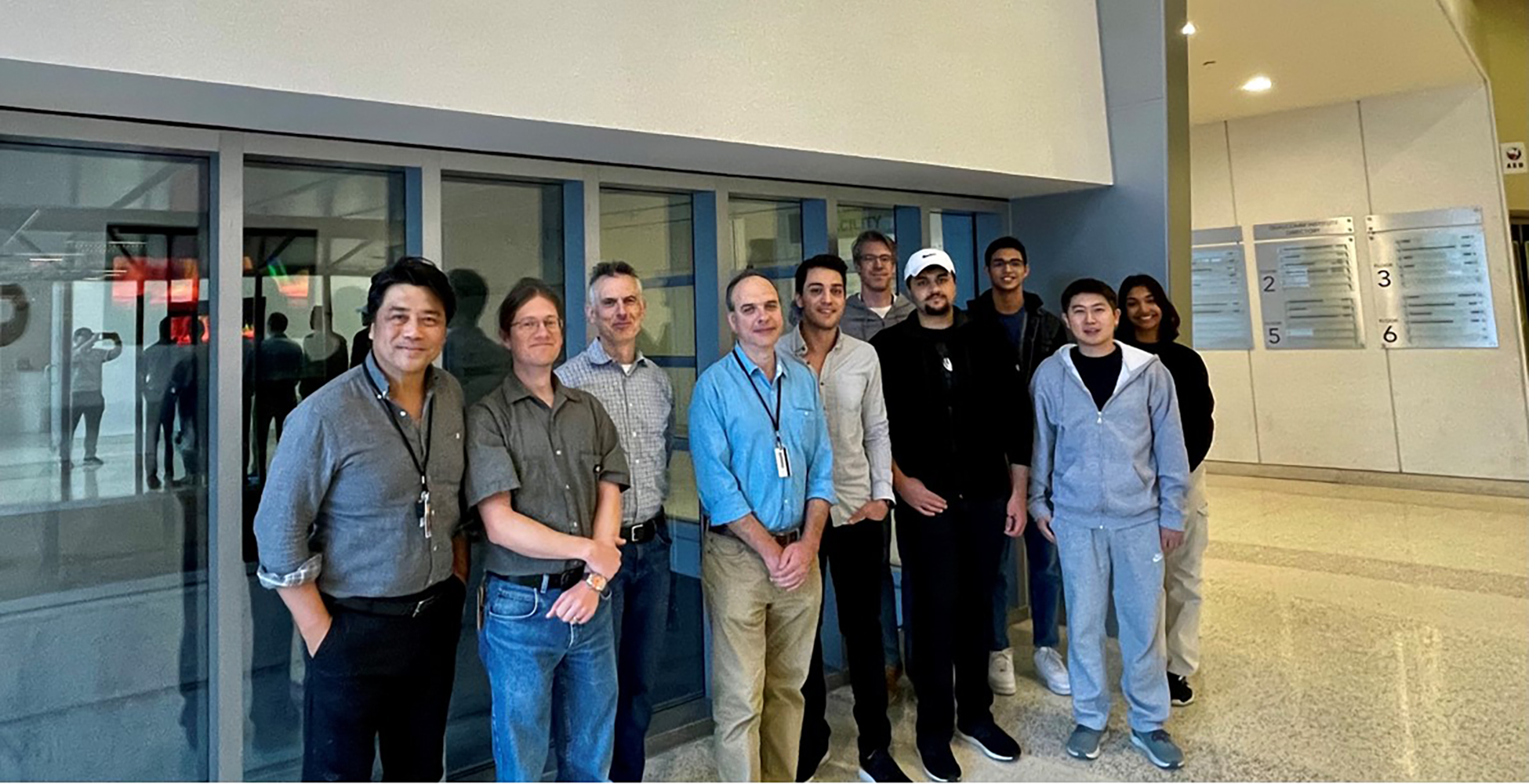Dimension Genomics Builds Momentum in the QI Incubation Space

When Han Cao was looking for a place to base his new company in early 2021, his main requirements were access to biotech development labs and a microfabrication clean room, as well as a location in San Diego—the best place in the country to launch a genome technology tool startup, according to Cao.
When UC San Diego Professor Yu-Hwa Lo, who oversees the nanotechnology facility at the Qualcomm Institute (QI), suggested the Qualcomm Institute Innovation Space (QIIS), Cao found a place that met those needs and much more.
One upside was access to UC San Diego students. “We now work with four UC San Diego interns,” he said. “A location steps away from where bright students study and train in top biotechnology and engineering programs has been ideal.”
Another unexpected upside emerged when COVID-19 swept across the globe.
“Most microfabrication clean room facilities in the country shut down for at least part of the pandemic,” Cao said. “The Qualcomm Institute Nano3 cleanroom is one of the only such operations in the U.S. that never closed its doors, even briefly, thanks to Dr. Bernd Fruhberger and his staff who kept it running. That allowed smaller companies like us—and bigger ones, too—continued access to survive and thrive.”
Marrying Medicine and Nanotechnology
Cao was not a complete stranger to QI’s Nano3 facility. In fact, he had played a role in promoting the need for Nano3—so named because it spans nanoscience, nanoengineering and nanomedicine—during its initial appeal for federal funding as part of the San Diego Nanotechnology Infrastructure (SDNI). SDNI is now one of 16 sites across the country funded through the National Nanotechnology Coordinated Infrastructure.
Cao’s own career has illustrated the potential of the pairing of nanotechnology and precision medicine. Trained as a molecular biologist, with a Ph.D. from University of Delaware and postdoctoral work in gene therapy at University of Pennsylvania School of Medicine, in the early 2000s he “reverse-commuted” and joined Electric Engineering Department of Princeton University. There, he brought a molecular biology perspective to an engineering-heavy project funded by the Defense Advanced Research Projects Agency (DARPA), where he and the team designed and fabricated a massive nanochannel array technology for genomic analysis.
“Innovation happens during multi-disciplinary work,” he said. “The nanochannel array was originally for a telecommunication application; we took a scrap piece and turned it into a device for completely new applications in a new field. You learn from each other, and sparks fly.”
It was during this time that Cao conceptualized and founded his first startup, Bionano Matrix, Inc. in 2004, which developed a revolutionary platform system for long-range, single-molecule-level genome analysis. That venture would consume the next 15 years of his career, in which Cao nurtured the company from idea to initial public offering and beyond. The firm now trades publicly under NASDAQ BNGO.
In 2011, Bionano relocated from the East Coast to San Diego, where Cao believed new funding and talent would give the firm a leg up.
“In San Diego, we could leverage the tremendous expertise in engineering, with talent from companies like Qualcomm, HP, and Sony; the know-how of people working for the giants in genomics technology, such as Illumina and Thermo; and the deep pool of world-class biomedical scientists at top names in that field, such as UC San Diego, Salk, Scripps Research, Novartis, etc.,” said Cao. “Together with the access to local experienced executives and top VCs, San Diego is a world hub for genomics tools and precision medicine.”
‘Fertile Ground’
So Cao was already in the right city when he prepared to launch his second venture. Joining him in the new enterprise were longtime colleagues and new talent from diverse disciplines, locally and from as far away as Boston.
As an early-stage startup, the team works on the next generation of proprietary technology in the precision genomics tool space, where it has potential applications in cancer and personalized medicine. Team members are enthusiastic about the technology and the milestones they have achieved to date, and passionate about what they do that could impact lives worldwide.
As they build momentum to move the venture forward, they are very grateful to be part of the Qualcomm Institute Innovation Space at UC San Diego and the support of the QI Director Ramesh Rao, QI Innovation Space manager Lovella Cacho and other QI staff.
“QI is a fertile ground for a multi-disciplinary venture,” said Cao. “We wouldn’t be where we are today without our location here.”
Read more about the Qualcomm Institute Innovation Space.